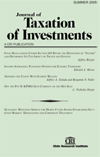Technological Versus Economic Life in Asset Depreciation: A Case Study
Author: António Martins.
Source: Volume 34, Number 02, Winter 2017 , pp.63-70(8)

< previous article |next article > |return to table of contents
Abstract:
In recent years, significant investments in solar (photovoltaic) panels were made in Portugal. Until 2015, Portugal’s corporate income tax code had no specific depreciation rate for these assets, only a residual rule that allowed tax authorities to apply what would be considered “the reasonable useful life.” Some litigation followed from the interpretation of this clause. Usually, tax auditors made adjustments, extending solar panels’ tax life based on the technological time span warranted by producers. On the other hand, firms usually based depreciation rates of panels on the period of energy production and supply negotiated with customers, and used these factors in computing a shorter economic life than that deemed reasonable by the tax authorities. This article discusses the issue, using case law and the legal research method, and concludes that the tax authorities’ view was excessively and unjustifiable restrictive. In the light of this controversy, in 2015 a depreciation rate was legally defined for solar panels in Portugal, based on the work of the “Commission for Environmental Taxation.” The issues involved are relevant to any jurisdiction’s tax policy.Keywords: depreciation, solar panels, useful life, corporate tax
Affiliations:
1: Coimbra University.